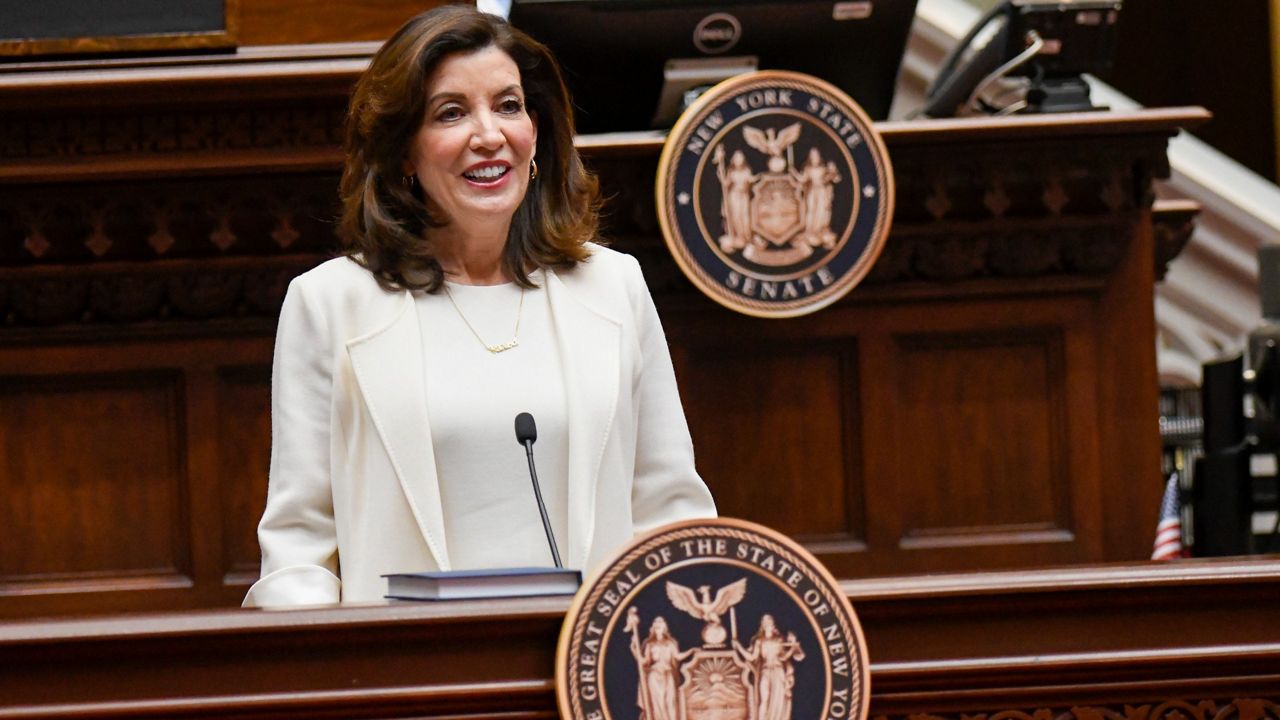Gov. Kathy Hochul unveiled her first formal agenda for the new year on Wednesday by calling for measures to address acute worker shortages in schools and health care systems after the COVID-19 pandemic decimated workforces across the economy.
Hochul's State of the State address, delivered Wednesday in Albany to a socially distanced group of only dozens of people in the Assembly chamber, comes as the state continues to grapple with the fallout from the pandemic and a rise in cases amid the spread of the omicron variant.
Hochul's agenda also takes aim at public corruption in Albany, and the watchdogs of state government by backing an overhaul to the commission in charge of regulating ethics and lobbying.
And, dipping her toe into national politics, Hochul called for an expansion of voting rights in the state.
In her prepared remarks, Hochul pointed to her history-making succession following the resignation of Andrew Cuomo in August, vowing to rebuild trust in state government as well as tackle the multi-vectored crisis of the pandemic.
"As governor of New York, I am well aware of the significance of this moment: the first time a woman has presented the State of the State," she said. "But I am not here simply to make history. I am here to make a difference."
Staffing shortages have threatened to close school districts across New York this month amid the spread of the virus. Hochul is calling for an immediate boost in education workers with a waiving of the income cap for the 169,000 retired teachers in New York who currently face limits on their earned income as retirees.
The teacher certification process would be accelerated under a separate proposal, as well as allowing provisional school professionals in classrooms. And Hochul wants to create a state teacher residency program as part of a broader mentorship program.
The pandemic, more immediately, has also stressed the state's hospital and health care systems. Staffed bed shortages have at various points in the last two months led to limits on elective procedures and surgeries at up to 32 hospitals.
Health care workers have quit either due to burnout from the last two years or due to vaccine requirements by the state.
Hochul called for a $10 billion infusion for recruiting more health care workers, with $4 billion of that going to better pay, as well as $3,000 bonuses for full-time workers who stay in their jobs for a year.
She also backed $500 million for cost-of-living raises for human services workers, many of whom are earning at or near the minimum wage. And she wants the state to cover tuition costs for people who choose to enter the health care field.
All told, Hochul's goal is to increase the state's health care workforce by 20% over the next five years.
Hochul last year identified a separate challenge from the pandemic following the resignation of Cuomo, who has faced allegations of sexual harassment and is under federal investigation for how his office tabulated the COVID-19 deaths of nursing home residents.
Cuomo and his administration had come under criticism for reportedly meddling with the state's ethics panel, the Joint Commission on Public Ethics, created a decade ago.
Hochul wants to replace the commission with a rotating five-member board of law school deans. The revamped panel would be subject to the state's Freedom of Information Law and Open Meeting Law.
Without going into detail, Hochul has plans for a state-level voting rights act that she indicated would be a counter to efforts in Republican-led states that critics have contended make it harder to vote.
Hochul, unlike previous governors who took office in the middle of a term, is not facing a state budget crunch. New York's coffers have been boosted by federal aid, as well as tax increases on upper income New Yorkers.
The governor, like all 213 seats in the Legislature, is running for election this year, facing a Democratic primary challenge from Rep. Tom Suozzi and New York City Public Advocate Jumaane Williams in June.
But Hochul has largely sewed up support from much of the state's political apparatus: She has raised millions of dollars in a matter of months to fund her campaign, and the Democrat seen as her main rival for the nomination, Attorney General Letitia James, dropped her bid in December.
The details of how Hochul will pay for her agenda won't come until she unveils her budget plan in the coming weeks.


